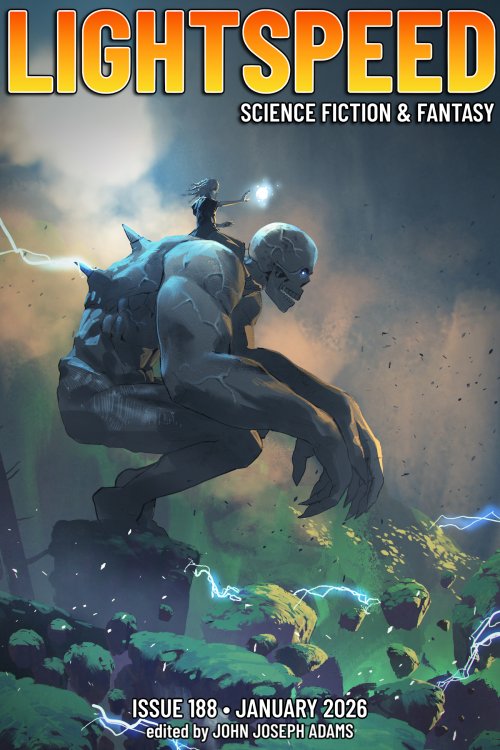How did this piece start for you—what was the inspiration and the process?
I’ve always wanted to write some sort of homage to the many science fiction/fantasy authors and stories that have influenced me personally, especially as a kid. That notion kinda evolved into an exploration of the ebb and flow of “the sense of wonder” in various stages of life. Plus, my writing generally tends to be heavy and tough to read, so I reached a point where I just wanted to write something lighter and more fun for a change. All that merged into “Gundark Island.”
There’s something about the pacing here that I can’t quite figure out. The story is longish in terms of “word count,” but it really zips by. It’s an effortless, smooth narrative. I received a call around page twelve and had to come back to the story immediately. I was done and thought: Huh, that was actually fast, but worked really well. How did you do that?
I tend to overwrite. Believe it or not, early versions of the story were actually much longer. It was an homage to the ’80s as well as science fiction. But the word count was definitely too high, so I took most of that out and just trimmed and condensed over and over and over. Even so, the final word count is still “longish.” In the end, I guess the story covers such a long arc in the narrator’s life that there is not much time to linger in any one spot—so hopefully that helps move the pace along quickly.
One of the best parts of the storytelling is the wonderful autobiographical feeling of this piece. Were you just getting in character and nailing the voice? Or does this touch on a lot of aspects of your childhood and life? Do you see yourself as similar to the POV character?
Perhaps not surprisingly, this story is extremely autobiographical. The voice is definitely my own. Which is a little awkward I suppose, but I think I wrote it mostly for myself anyway. The story is about letting go of the details and embracing the fun, and that applied to me, the main character, as well as to me the author.
A key concept here is the sense of wonder, awe, and adventure in stories. Not to mention, the ability to get lost in a story. Do you feel like genre, or fiction in general, has strayed from that sensibility?
I definitely see a long-standing trend towards realism and anti-heroes and flawed characters in all fiction and genres. In some ways, that is understandable and even commendable because every one of us lives in the real world with a list of flaws that we deal with daily. These types of characters are more relatable. Pulp fiction heroes who are inherently good and maybe even one-dimensional can be unrealistic and unattainable as role models.
But at what point do we start glorifying flaws or personal failings and start denigrating the ideals of the pulp hero? In the end, I think there is certainly a time and place for the dark and the heavy and the realistic, but sometimes it’s still nice to have a Captain Picard, Luke Skywalker, or John Carter to come in and save the day.
Is it possible for mere humans to help each other develop/maintain oro’nahtoo?
As a kid, I never had a questionably imaginary alien hand me a copy of A Princess of Mars to read, but I did pull it off my dad’s bookshelf one day when I complained I was bored and he told me to go find something fun to read. My wife and I saw The Fellowship of the Ring in theatres when she was eight months pregnant with our first daughter, and to this day the Lord of the Rings soundtrack is my daughter’s favorite music. So I think there is a window in childhood that can set the stage for adulthood, and I have to admit that as a parent I have not been above exploiting that myself. I’ve tried to expose my kids to all the classic stories that influenced me.
In adulthood, though, it seems easier to lose oro’nahtoo. Young kids are so accepting, and adults are so judgmental. As an adult, and especially as a writer, I know I tend to over-analyze stories, which detracts from the sense of wonder to be found in them. So I try hard to read more from the reader point of view, and even the kid point of view, and not so much the adult or author point of view.
It’s been a while since your stories appeared in F&SF (not to mention one of Rich Horton’s Best of the Year’s). Is this piece also, in a sense, about a return to writing? Will we be seeing much more from you (and what are you working on now)?
I suppose, just as a reader of science fiction can go through different phases of oro’nahtoo, so too can a writer of science fiction. The gaps in my publishing don’t necessarily mean I’m not writing. In fact, I’m always working on my requisite epic fantasy novel, and maybe someday I will actually finish it. Or not. But while I would love to be a professional writer, that just isn’t in the cards for me. For various reasons, I am the opposite of “prolific,” and writing doesn’t come easy for me. So when my “creative” oro’nahtoo does kick in, I am happy to finish an occasional story that might see the light of day somewhere. Luckily this time it was in Lightspeed. Thank you for the opportunity!
Enjoyed this article? Consider supporting us via one of the following methods:










